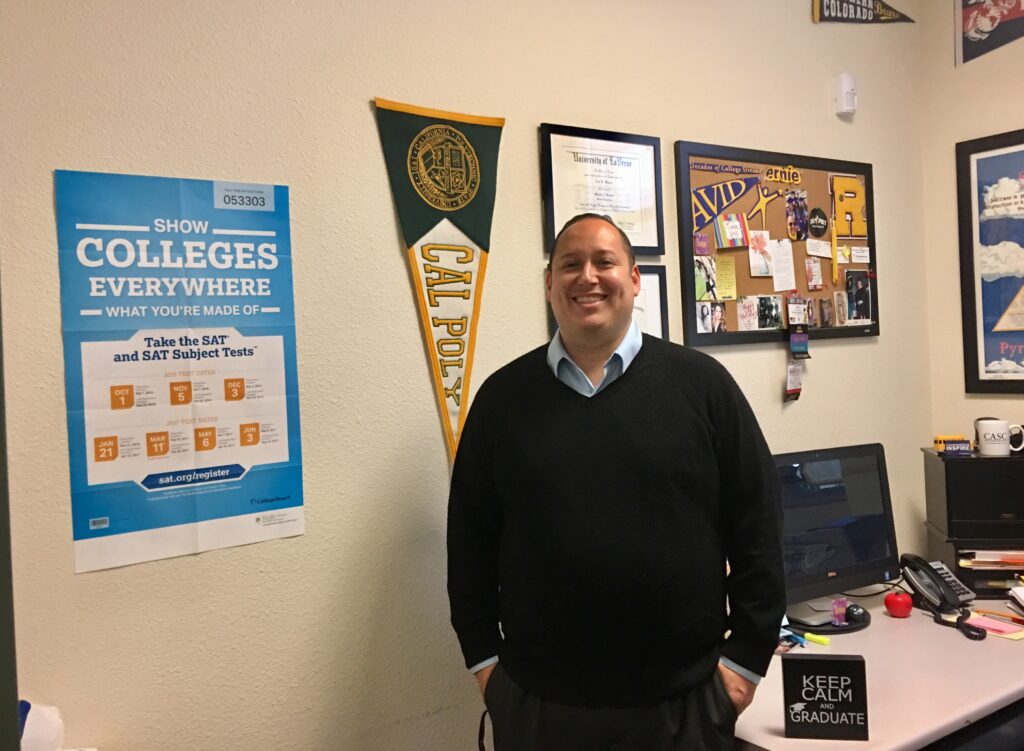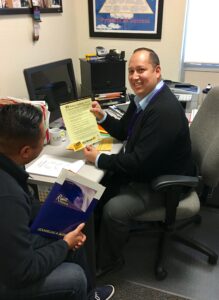
Black teachers: How to recruit them and make them stay

Lessons in higher education: What California can learn

Keeping California public university options open

Superintendents: Well-paid and walking away

The debt to degree connection

College in prison: How earning a degree can lead to a new life

This has been a busy season for Eric Blanco, a high school counselor at Ernest Righetti High School, his own alma mater in Santa Maria. The deadline for UC and CSU applications recently passed; his students are finishing applications for private colleges and then must file financial aid forms. Blanco is advising 210 seniors, with last names from M-Z, a workload that was much reduced this year with the hiring of a colleague to share the graduating class.
That workload issue is crucial to Blanco, who is president of the California Association of School Counselors, a professional group of about 1,400 members. On average, California high schools had one counselor for every 468 students, the worst record of any state and far worse than the national average of 250, according to 2014 U.S. Department of Education statistics.
California has made some progress with improved budgets in recent years, but needs to continue to do so, said Blanco. He has been a high school counselor for 14 years and previously worked in student outreach at University of California, Santa Barbara. Blanco, 42, attended Allan Hancock College, the local community college, and then earned a bachelor’s in psychology at Cal Poly San Luis Obispo and a school counseling master’s degree at the University of La Verne. Blanco recently spoke with EdSource correspondent Larry Gordon about the challenges and rewards of the counseling profession and college guidance. Here is an edited version of the interview.
What does it mean for counselors to have such a big caseload of students?
What winds up happening with the big case load is ultimately you have to do triage. You really have to deal with the most urgent crises, which are going to be those students who are at risk of dropping out, who are failing multiple classes. And you also end up with the other extreme, the students who are doing extremely well and you make sure their college applications are turned in on time. What happens is that a large group of students in the middle are not being serviced enough. And that is not fair for those students….At sites where the student-to-counselor ratio is really high, some students feel they cannot talk to a counselor because they are so busy. But I would stress to the students to keep going and introduce yourself and develop a relationship. It will help having that person who can talk to you about academics and college planning and about those very difficult days when life is not going the way you planned.
How has the job changed in recent years?
The biggest change has been technology: the increased computer use for keeping data, college applications, even building student schedules….And with social media, like Twitter and Instagram, bullying issues. We have to make sure our students feel safe and are aware of what they are posting and what they are saying…. The demographics have changed. We have to make sure we are providing services to all students. Make sure underserviced populations such as LGBTQ students, foster youth and undocumented youth have access to college information and social, emotional support.
What are the biggest mistakes students and parents make in the college application process?
They start the whole conversation too late in the process. They may start talking about college at the end of junior year. But I would recommend having that conversation earlier, even in elementary school, but definitely middle school. Go to college fairs if you are able to access those, get involved in programs that prepare students for college. Second, I see a lot of students disqualifying themselves for schools or scholarships. What I really encourage is that they apply and let the colleges and financial aid offices make the decisions.
What should high school juniors do to get ready?
They can start working on their applications. They can start doing drafts on UC’s (personal) insight questions. So when they get to senior year, they have solid answers to those questions. And if they have not done any community service, I’d recommend they start putting in hours. And look at college summer programs for exposure to universities, to see what it is like to be in a dorm and walk on campus and say: “OK, I can see myself doing this.” And if they are on track academically, they should finish that junior year strong; if they failed a class required for an A-G requirement, they need to develop a plan to repeat that course and get back on track.
When acceptances and financial aid offers arrive, do you suggest families should negotiate for more aid?
There are situations when families lose jobs or someone gets ill and they have major medical expenses. If things like that didn’t come up in the initial application, then I would definitely encourage that they contact the financial aid office at the university…. And if someone is trying to make a decision between a couple of schools that offered different amounts of aid, it is always beneficial to contact the financial aid offices and request a review of the aid packages. It doesn’t hurt to ask.

Jose Pereyra
Eric Blanco, president of the California Association of School Counselors, at his desk in Ernest Righetti High in Santa Maria.
What do you tell students about attending community college? Is it a fallback or a first line for students?
We have a really great community college (Allan Hancock) in our community, and many of our staff and teachers started there. So we have a great working relationship with the college…. But as students come in as 9th-graders, we tell them we are going to prepare them for all the options. We want you to take all the A-G requirements (for university admission). We are not saying you have to go to a four-year school, but we want that option to be available. In senior year, you will have the options of a community college, a four-year university, a private college or to choose the military or a vocational school. We are going to support the student making that choice. But we want to make sure they have a choice.
With so much emphasis on college, how do you help students who want to go directly into the workforce?
We have a lot of students who are into computers and business and they don’t want to get a four-year degree; they want to go into an entry-level job right out of high school. So we have our career fair each year and do bring in a lot of programs from vocational schools and local manufacturing companies…. We do interest surveys and try to match students with potential jobs they might be interested in and provide them with potential career paths.
Do you ever hear from students after graduation? Ever get surprised that some kids who were not successful in high school turn out to be successful later?
That is one of the most rewarding parts of being a school counselor. Sometimes in the four years you have them in high school, you don’t always see the successes. So it’s really cool to have a student come back in person, or email you or send you a letter saying thanks for your belief in me or that the words you mentioned in that presentation really struck me and now I’m in this career field or now I completed my four-year degree and am looking into a master’s. That really energizes you. That is really the reason we came into this profession: to have those life-changing conversations that impact students not only when they are here but into the future as well.

Panelists discussed dual admission as a solution for easing the longstanding challenges in California’s transfer system.

A grassroots campaign recalled two members of the Orange Unified School District in an election that cost more than half a million dollars.

Legislation that would remove one of the last tests teachers are required to take to earn a credential in California passed the Senate Education Committee.

Part-time instructors, many who work for decades off the tenure track and at a lower pay rate, have been called “apprentices to nowhere.”
Comments (1)
Comments Policy
We welcome your comments. All comments are moderated for civility, relevance and other considerations. Click here for EdSource's Comments Policy.
Loretta Whitson 7 years ago7 years ago
Great article that clearly articulates the intricacies of high school college and career counseling. President Blanco does a great job in underscoring the need for more school counselors in California K-12 school system.